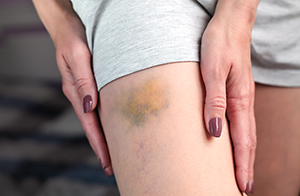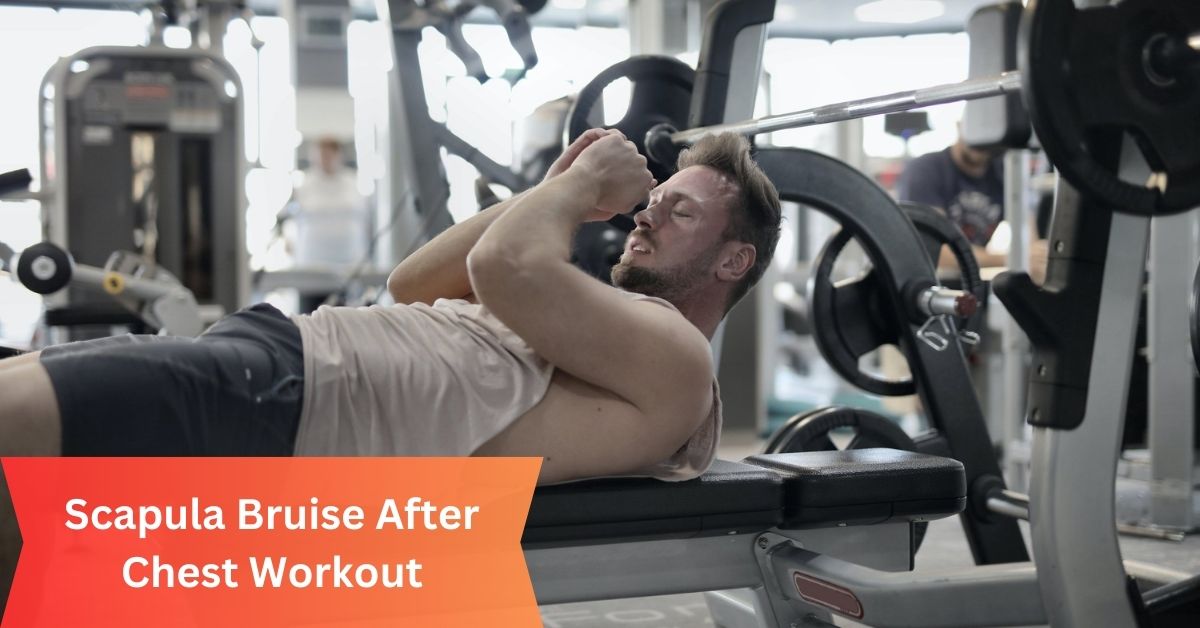A scapula bruise after a chest workout happens when small blood vessels break due to impact or pressure. This can occur from lifting weights or improper form. Bruises are usually harmless, but if pain or swelling persists, it’s best to see a doctor.
In this article, we’ll explore what causes a scapula bruise after chest workouts and how to prevent it. We’ll also cover when to be concerned and tips for safe exercising.
What Is Bruising and How Does It Happen?
Bruising happens when tiny blood vessels under the skin break, causing blood to leak into the surrounding tissue. This usually occurs due to impact or pressure, like during workouts.

When you lift weights or push yourself too hard, the force can damage these vessels, leading to a bruise. The area may appear discolored and sore, but most bruises heal on their own after a week or two.
Types of Bruising:
Superficial Bruises
These are mild bruises that occur just below the skin’s surface. They typically appear red or purple and heal quickly, often within a week.
Deep Bruises
Deep bruises affect the muscle tissue beneath the skin. They can be more painful and may take longer to heal, sometimes several weeks.
Contusions
Contusions are deeper bruises caused by a direct blow to the muscle. They can lead to swelling and significant pain, requiring rest and care for recovery.
Common Areas Affected By Exercise-Related Bruising:
Exercise-related bruising often affects several key areas of the body. The scapula, or shoulder blade, is commonly bruised during weightlifting or due to improper form. The chest area can also experience bruising, especially during exercises like bench presses.
Additionally, upper arms may bruise from repetitive movements, while thighs can get bruised from contact or impact during leg workouts. These areas are particularly vulnerable due to the pressure and strain associated with physical activity.
When To Be Concerned?
You should be concerned about a bruise if it comes with severe pain that doesn’t go away or if it appears without any obvious cause.

If you notice swelling, limited movement in the area, or signs of infection like redness and warmth, it’s important to see a doctor.
Frequent bruising or bruises that take a long time to heal can also indicate an underlying health issue that needs attention.
Medical Conditions That Can Cause Bruising:
Certain medical conditions can make you bruise more easily. Blood disorders, like hemophilia, affect how your blood clots, leading to more frequent bruises.
Thrombocytopenia, a condition where you have low platelet levels, can also increase bruising risk. Some medications, especially blood thinners, can make it harder for your blood to clot, resulting in easy bruising.
Additionally, vitamin deficiencies, such as low levels of vitamin K or C, can weaken blood vessels, making them more likely to break. If you notice unusual bruising, it’s a good idea to talk to a healthcare professional for advice.
Read Also: Naltrexone 4.50mg – Speak to a Specialist For Capsule Today!
3 Tips for Preventing Exercise-Related Bruising
Warm Up Properly:
Always start your workout with a good warm-up. Stretching and light exercises help prepare your muscles and joints, reducing the risk of injury.
Use Proper Form:
Focus on your technique when lifting weights. Using the right form helps prevent unnecessary pressure on your body, lowering the chances of bruising.
Choose Suitable Equipment:
Make sure your weights and equipment fit well and are appropriate for your strength level. Using the right tools can help avoid accidents and minimize bruising.
How You Can Avoid Bruising While Exercising?
To avoid bruising while exercising, always warm up properly, use the correct form during workouts, and choose the right equipment.

Listen to your body and take breaks if you’re in pain. Being cautious and prepared can help keep you safe and reduce the chances of getting bruises.
Why Do My Shoulder Blades Bruise When I Bench Press?
Shoulder blade bruising during bench presses can happen for a few reasons. First, the pressure from the barbell can cause small blood vessels to break if the weights are too heavy or if your form is off.
Additionally, repeated movements can irritate the area, leading to bruising. It’s important to ensure you’re using proper technique and manageable weights to prevent injury and protect your shoulder blades during workouts.
Is It Normal to Get Bruises After Lifting Weights?
It’s not uncommon to get occasional bruises after lifting weights, especially if you’re new to exercising or pushing yourself hard.
However, frequent bruising may signal that you need to adjust your technique or weight. Always listen to your body and see a doctor if you have any concerns.
Read Also: Dinneroz – Details About Recipe Dinner Ideas In 2024!
Why Does My Scapula Hurt After Working Out?
If your scapula hurts after working out, it could be due to muscle strain from lifting heavy weights or using improper form. Repetitive movements, like bench presses or push-ups, can also cause soreness in the area.

Sometimes, tension in the surrounding muscles can lead to discomfort as well. If you’re not warming up properly or not giving your muscles enough time to recover, this can increase the pain.
To help, focus on your technique, warm up before workouts, and allow time for rest and recovery. If the pain persists, consider talking to a healthcare professional.
Frequently Asked Questions:
1. Can I continue working out with a scapula bruise?
Yes, but it’s essential to avoid exercises that exacerbate the pain. Listen to your body.
2. How long does it take for a scapula bruise to heal?
Most minor bruises heal within one to two weeks.
3. Should I ice a bruise?
Applying ice can reduce swelling and alleviate pain during the first 24 hours after the injury.
4. Can stretching help with scapula pain?
Gentle stretching may relieve some tension, but avoid overstretching or pushing through pain.
5. When should I seek medical attention for a bruise?
If you experience severe pain or swelling, or if the bruise doesn’t improve in a week, consult a doctor.
Conclusion:
In conclusion, a scapula bruise after a chest workout can occur from impact or pressure.
While most bruises heal on their own in a week or two, it’s important to use proper form and listen to your body. If pain persists or worsens, consult a doctor for advice.




